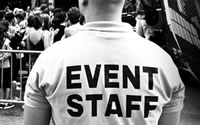Recent tragic events in London, Paris, Barcelona, and Charlottesville have highlighted the dangers of crowds in high profile cities or high profile events. Indeed, we were recently cited in a New York Times article entitled “Europe Beckons, but Security Consultants Urge: Be Prepared.”  The strength of the dollar vis-a-vis the British Pound and the Continental Euro have made travel to Europe cheaper than ever for Americans, and of course the cultural attraction of Europe puts the United Kingdom and the Continent on nearly everyone’s “bucket list.” Short of refraining from travel and living in total fear, what are some practical tips for “travel security in a crowd.” Below we provide a non-exhaustive list:
The strength of the dollar vis-a-vis the British Pound and the Continental Euro have made travel to Europe cheaper than ever for Americans, and of course the cultural attraction of Europe puts the United Kingdom and the Continent on nearly everyone’s “bucket list.” Short of refraining from travel and living in total fear, what are some practical tips for “travel security in a crowd.” Below we provide a non-exhaustive list:
- Research the Security Situation. First and foremost, before you travel abroad, research the security situation of the country or countries to which you are going. The US Department of State provides security briefings as does our sister site, GlobalSecur at http://www.globalsecur.com/. Educate yourself on the political situation, culture, and potential security risks – not just those from terrorism but also those from medical problems (such as Zika, for example) as well as natural disasters (such as vulnerabilities to events like hurricanes, floods, or even earthquakes).
- Establish a Communication Chain. Identify key family members, friends, or business colleagues at home whom you will attempt to contact in the event of an emergency. Remember that online communications such as email or even Twitter allow for asynchronous communication in a way that phone calls do not. Just having someone’s Twitter handle or email address will mean that a notification can be sent. Facebook has an innovative feature called Safety Check which can also be used for this purpose. A more robust app such as our FoneTrac® travel safety app can also serve this purpose.
- Be Inconspicuous. Let’s face it. British citizens, Europeans, Canadians, and especially US citizens can be targets of hostility just because of nationality. For this reason, consider “being inconspicuous” when traveling abroad. That means, dressing and acting appropriately by the standards of the host culture and leaving “loud” clothing or behaviors at home. The same applies for markers of economic wealth. A fancy Rolex watch, expensive jewelry, or other materials goods that “advertise” one’s financial status may not be a smart idea when traveling abroad.
- Be Aware. Awareness is an incredibly important factor to security. Therefore, if you are in a crowd such as a tourist destination, rock concert, or even a political event, stay aware of your surroundings. Look around for potential threats. Identify exist routes. Discuss with your companions what to do “if” something happens and you get separated. Being aware is critically important to survival.
- Consider Travel Insurance. While events such as terrorism grab the headlines, the more mundane problems such as getting sick in a foreign country or being a victim of street crime are much, much more common. For this reason, a travel insurance policy may help in the event of a necessary hospitalization or even a medical evacuation. Consider, for example, UnitedHealthcare’s “SafeTrip” offering. It’s worth mentioning that there is an important difference between medical insurance and medical assistance. The former provides reimbursement for overseas medical services, while the latter ensures that you get the medical treatment you need at a medically-preferred facility with a guarantee of upfront payment is this is demanded.
- Use a Travel Security App. Beyond mere communications, robust apps such as FoneTrac can both “push” and “pull” information about a travel security situation. It is wise, therefore, to evaluate and install a robust travel security app before traveling and enable the background support so that the app has the capability to both push and pull information on security from the cloud, or – even better – from a robust service such as our own GlobalSecur.
Todos at Large Gatherings
The above are some salient todos when traveling abroad, in a far from exhaustive list. But what about crowds themselves? Let’s turn to the issue of crowds and large gatherings. First, if at all possible, avoid crowds. Crowds have clearly become a target for terrorist and what with the recent “trend” towards weaponizing cars and trucks against crowds of innocent victims, one should think twice before being in a large crowd. Consider whether it is “worth it” to be in a crowd, or whether this particular event or attraction can be missed. This goes not just for large public gatherings but also for larger restaurants and marquis establishments. Try boutique restaurants and vary one’s routines. Second, consider postponing large concerts or gatherings to one’s home country. It may be safer to see your favorite pop star in New York than in a foreign city, not the least of which because (unfortunately) these events are more common in Europe than in the United States. Finally, if one is at a crowded event, be aware of one’s surroundings and make a mental plan of how to exit or seek safety in case of an event. Simply scanning for exit routes should an attack occur may save the critical seconds necessary to save one’s life.
For corporate and organizational clients, IMG GlobalSecur can conduct an organizational security audit and help draft best practices for executives and employees for travel abroad. Effective travel security, after all, depends on effective planning.